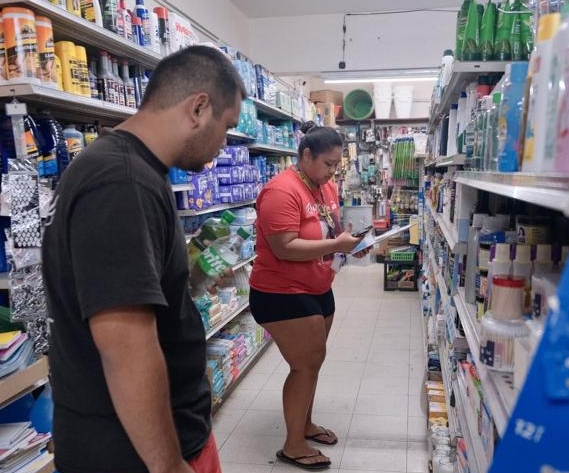
Leani Castro and Vincente Castro shop at Buenas Market in Yona, Guam on June 3, 2025.
Photo by Frank San Nicolas/The Guam Daily Post
HAGÅTÑA (The Guam Daily Post) — The proposed reduction of the business privilege tax from 5% to 4%, “presents a reasonable policy response to current economic conditions with expected net positive effects for Guam’s consumers and businesses,” according to Roseanne Jones, dean of the University of Guam School of Business and Public Administration.
The longtime UOG economics professor submitted written testimony, but was unable to testify at Monday’s well-attended public hearing on Sen. Shawn Gumataotao’s Bill 11-38 to roll back the BPT that was raised in 2018 after the federal Tax Cuts and Jobs Act resulted in a significant loss of government of Guam tax revenue.
At the hearing, administration officials testified against the rollback as it would result in an $80 million dollar loss in much-needed tax revenue, while the business community said it was long overdue to help the island’s struggling businesses.
In her economic analysis, Jones wrote that global inflationary trends warrant legislative consideration of tax policy adjustments, particularly for U.S. territories and island economies with limited economic diversification.
“Many jurisdictions facing similar cost of living pressures have implemented tax relief measures to support residents and businesses during inflationary periods,” she said.
“Given Guam’s economic isolation and import dependence, (the) BPT tax policy has amplified effects on both business operations and household purchasing power,” she added.
Current data shows Guam’s cost of living is approximately 31% above the U.S. mainland average, while average wages of $20.29 per hour are significantly below the U.S. national average of $31.48 per hour, according to Jones.
However, “the extent to which businesses pass tax savings to consumers depends on market competition levels, which vary significantly across sectors in Guam’s economy,” Jones said.
For the government, Jones said a one percentage point reduction equates to a 20% reduction in BPT revenues, which requires careful fiscal management to safeguard the government of Guam’s essential obligations for education, public safety and other core services.
“The degree to which increased economic activity will generate replacement revenue through other tax or other sources remains uncertain and depends on various factors including consumer spending patterns, business investment decisions and federal government policy actions,” Jones said.
Jones said a close monitoring of the fiscal impact, including “price impact tracking of key household expenditure categories to document pass-through rates by sector, would be useful information to manage through this time of economic uncertainty.”
“The policy represents standard economic development practice of accepting near-term revenue reduction to support economic stability and stimulate longer-term growth,” Jones said.
In summary, Jones said, “The economic analysis supports reducing the (BPT) as a measured response to current economic pressures. While specific outcomes cannot be guaranteed, the policy direction aligns with established economic development practices and addresses documented challenges facing Guam residents and businesses.”
A continued hearing on Bill 11-38 will be announced.










